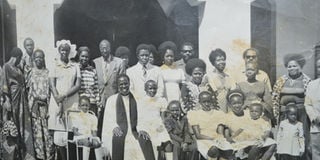Prime
Remembering Uganda’s first black police boss Oryema

The family of Lt Col Wilson Erinayo Oryema pose for a group photo with Archbishop Janani Luwum in mid 1970s. Photo by Ivan Okuda
What you need to know:
Icon. Former Inspector General of Police Wilson Erinayo Oryema was appointed the first African IGP on April 17, 1964 by then premier Apollo Milton Obote only to be killed years later by ex-president Idi Amin’s operatives and was not accorded a State burial. His reburial is slated for September 18, at his ancestral home in Tangi village, Purongo Sub-county in Nwoya District. We revisit his life and career.
Former president Idi Amin Dada had a way with words, coining and giving them wild and wide connotation. He, for instance, found it healthy to refer to police officers in the 1970s as women because in his wisdom, the men of the khaki uniform were ‘cowards’ and not as ferocious as his daredevil soldiers.
So one can only imagine the impression the former Inspector General of Police (IGP) Lt Col Wilson Erinayo Oryema cut in the eyes of President Amin.
On May 2, 2012, Ms Rhoda Kalema, a former National Resistance Council member (1989-1996) and former Constituent Assembly delegate (1994-1995) wrote in the Daily Monitor,“….During the first Uganda Government, the Uganda Police kept a ‘heavenly’ image…..It was little wonder that the then IGP, Erinayo Oryema, who was a true symbol of law and order, was murdered in cold-blood.”
Indeed, all available literature on and about the first Ugandan IGP is consonant with Ms Kalema’s assessment of Mr Oryema.
But who exactly was Oryema?
Born on January 1, 1917 in Tangi, Purongo in Nwoya District, Oryema succeeded Micheal Macoun the last British IGP upon completing training at the elite Hendon and Brownshil in Britain and another three months course in 1963 at the International Police Academy in Washington. This was after graduating as a teacher from Buwalasi Teacher Training College, Mbale in 1935 and he was posted to Gulu High School in 1936. Oryema was to later work as a school master in Gulu and Kitgum districts.
In 1939, he was enlisted with the Uganda Police Force as a constable and selected as sub-inspector training. That training would later be put on hold thanks to the start of the World War II that got him serving as corporal (number 9176) on November 1, 1940. Oryema served in the fourth Battalion of the Kings African Rifles Regiment from June 14, 1941 to March 6, 1947.
On his return to Uganda, he was promoted to the rank of Inspector of Police on January 1, 1951 and assistant superintendent of police three years later. By April 1, 1964, he had risen to first native African IGP, having sky-rocketed through senior ranks like assistant commissioner of police (1962) and deputy IGP (April 1963)
He was dropped as IGP shortly after Amin ascended to the presidency in 1971 and later appointed minister of Minerals and Water Resources (2nd February 2, 1971 to June 30, 1974) and minister of Lands, Housing and Physical planning (July 1, 1976 and February 17, 1977).
The father of 11 was killed in cold blood by the Amin forces, alongside Archbishop Janani Luwum and Defence minister Oboth Ofumbi and buried without ceremony in present-day Nwoya District in 1977. Lt Col Oryema will be reburied on September 18, 2014 at his ancestral home in Tangi, Nwoya District; this national occasion will be preceded by a memorial public lecture at Makerere University on September 16, 2014.
“He served this country diligently but at the time of his burial, he was not accorded decent burial. We thought of honouring our fallen police heroes who lost their lives while serving this country. He was brutally murdered and he paid his ultimate price in serving the country,” Gen Kale Kayihura said recently during a visit to the current resting place of the first indigenous IGP in Nwoya district.
He added: “The museum will help in keeping the history of our prominent police officers since in all the past years, no fountain of honour in form of monument or museum has been made for their services”.
In his book, The Dungeons of Nakasero, author WodOkello Lawoko, who worked as a journalist during the Amin era, severally cites Mr Oryema’s name, painting vivid image upon image of the IGP and later minister whose patriotism, selfless service and commitment to the force was self-evident. His fast rise through the ranks of civil service in Uganda from a Kings African Rifle soldier, school teacher, police constable to IGP and later minister is well documented.
Ms Gertrude Auma Oryema, Oryema’s eldest child, has a memory still fresh and intact. She plucks out memories of Oryema with noticeable passion and emotion.
Uganda’s first indigenous IGP’s illustrious career was one of “selflessness, passion for job and patriotism.”
In an interview with Sunday Monitor, she shared a reconstruction of the life of Uganda’s indomitable former IGP.
“I was born in 1939 as the first child to Mr and Ms Oryema. This year and my birth in the same year have a rather powerful emotional attachment in and to our family. It was the year our father, Oryema joined the Uganda Police Force,” she says.
His time as a police officer
About the early days of his career, the 75-year-old Auma says, Oryema was transferred quite frequently so much that they almost became nomadic students.
At one time they were in Gulu, when the next police transfer window opened, they would be in Mbale and then Mbarara. She adds: “In Mbarara, he was jokingly referred to as a lost Munyankore because he was handsome and tall.”
Mr Oryema was strictly a family man. Auma shares, “He adored and spent valuable time with his family. His busy work schedule was never an excuse.”
Outside family, however, she recollects fondly, their father loved the company of fellow police officers with whom he occasionally met and discussed business. He really never went out for social gatherings as frequently as some of his colleagues did.
For Auma, the high esteem in which the former teacher held officers, even those below his rank, awed her. He particularly had an infectious affection for the police band, led by officer Venancio Okello at one time and the special branch of police that he founded.
“Another time he really impressed and inspired us when he was transferred to Soroti in eastern Uganda. There, some thugs of Arab origin had stolen lots of jewellery from an Asian man’s shop and pitched camp at Soroti rock from where they sold the treasurable items to the public.”
When Oryema was tipped off, he organised a group of police officers to dress like and impersonate Arabs, posing as prospective buyers. He was to later return with bruises and several pieces of the jewellery in his car and hand them back to the shop owner.
“I vividly remember that we always had something to eat or drink for everyone that came home. My father never idolised earthly belongings,” she says, pointing at his photos hanging in the living room at their Gulu house. She also remembers how he detested the idea of his children reading newspapers, arguing that journalists often time turned facts upside down for commerce and news sake.
Of all his legacies, however, what stands tall for Auma is Oryema’s belief in the unity of his force.
Current Force
Accusations of mishandling continue to dog the image of the force that civil society and political activists accuse of being militarised and a rubber stamp of the current regime. The current IGP has come under fire for being used as President Museveni’s whip against the Opposition with calls for investigations by the International Criminal Court.
In a recent interview with this newspaper, Gen Kale Kayihura scoffed at his critics, saying he does not fear the world court and is ready to defend his record.
Oryema, his daughter says, “despised tribalism and always looked at everybody as a Ugandan first. He also refused to get dragged to partisan politics. At the time, Uganda Peoples Congress and Democratic Party were at their political peak.
When he was appointed IGP, Oryema emphasised cleanliness and order among his officers. A policeman - he argued - had to set the example for society. He initiated periodical inspections in which policemen and women competed in cleanliness and won prizes.
He was also strict on alcoholism in the Force.
“Sometimes he would tip toe at night to the barracks and find soldiers drunk and dead asleep, then he would pick the gun and wait for the officer to report loss of the gun and issue a stern warning,” Auma recalls.
His death
Lawoko writes in his book that from the word go, Oryema (pictured) and Amin were never going to be on the same page. In fact, the journalist argues, Lawoko was among the few Ugandans, with legendary poet Okot P’bitek, who fore saw anarchy in the Amin era.
For that matter, he had strong reservations about the military coup, landing him into trouble. It took the intervention of foreign diplomats to get Oryema out of Amin’s claws.
The officer, however, felt indebted to the diplomats who had negotiated his freedom and consequently listened to their pleas for him to work with Amin instead of fleeing to exile. “He reluctantly accepted,” Lawoko writes.
First he was dropped as IGP and appointed minister and later exterminated by Amin.
His daughter recalls with emotion, “On February 14, 1977, I was on my way to our farm in northern Uganda and chose to pass-by and have a brief conversation with him at home in Nakasero. His mood was low. Something was not right. He casually shared with me his misunderstandings and disagreements with President Amin and how he felt insecure”.
All of a sudden he stopped writing his auto-biography and told her, “I am tired! You will finish the rest of my book.” He then took to his family history and childhood moments, painting vivid images of his hardest times.
Amin’s propaganda machinery was to later claim he was involved in an accident after a scuffle with the driver.
“The soldiers surrounded our house in Nakasero and ordered us to park all our belongings in an hour. At 5pm we reached Gulu amid tight security, only to find my father’s body cemented and soldiers guarding it,” she says, adding, “The locals who dug the grave told us a Shs50 note was put on his chest, his head was bandaged and he had a bullet wound around the chest.
”
Since then, Auma and family have grieved to have him receive a decent burial. Her daughter who stays in London has personally written to the Queen of England asking her to speak to the Ugandan government to grant him a decent burial.
This is why the reburial of the late Oryema holds a world of meaning for the family and his memorial is an integral bolt of the police centennial celebrations.
Police image
In July this year, the BBC reported thata human rights group said street children in Uganda face constant abuse from police and other government officials.
Police beat children with whips and wires, throw them into jail and extort bribes from them, a report by Human Rights Watch (HRW) said.
Street boys and girls were also raped by men and older boys, it added.
A Ugandan official, Mondo Kyateka, said some street children were “hard-core criminals” but police only used minimum force against them.
The government should focus on improving the lives of street children, and prosecute those responsible for abusing them, HRW said.
More than half of all Ugandans are under 15, and children are the single largest group living in poverty, HRW said.
The police later denied allegations.




